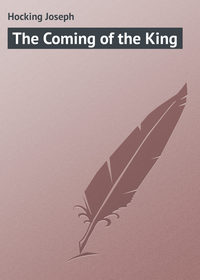 полная версия
полная версияThe Passion for Life
"I know what you have experienced and suffered," I said, "and I know what your suffering has done for you; but you know little of my story; I want to tell you more about it."
"Yes, yes, tell me!" he said eagerly.
And I told him – told him of the doctor's verdict; told him of my longing for life; told him much that I have set down in these pages.
"I can't explain it," I said, when I came to describe the experiences through which I had passed after the great darkness fell upon me, "but I KNOW, I SAW."
"You felt that, saw that?"
"God and immortality are not matters of faith to me now, Mr. Lethbridge; they are matters of consciousness; that is why I am so certain about Hugh. He is not dead. A lad who could do what he did had Eternal Life in him. God is here all the while; it is only our blindness that keeps us from seeing Him. Hugh is still your son. There are only two eternal things, Mr. Lethbridge."
"Two eternal things," he repeated, "only two?"
"Life, love. That leads me to what I want to say to you now."
He looked at me with keen interest.
"I love Isabella," I said simply. "Haven't you guessed it?"
"What! Do you mean – ?"
"I do," I said. "Will you give her to me?"
"I – I have seen a change in her lately, and – and – But, my dear boy – "
"I am afraid I am what you will call a poor match," I went on. "The doctor says it will be months before I shall be fully strong again, although he promises me that I shall be able to resume my old profession in a couple of months from now. Perhaps my clients will have forgotten me; still, I think I can get some new ones; my reputation seems to be better than I thought it was. Besides, if I become fully strong again, I shall feel it my duty to offer my services to the country; so I shall be a poor match, I am afraid, but I love her."
"And she?" he asked.
"She knows all I have told you," I replied.
"And – and – that has made all the change in her then. Why – why – "
"Will you give her to me, Mr. Lethbridge?" I repeated. "Will you let me take Hugh's place as far as I can? I will give my life to make her happy."
His astonishment seemed too great for words; several times he attempted to speak, but broke down each time.
"But, Erskine, my lad," he said at length, "Erskine – "
"You will, won't you, dad? If you don't, I shall run away with Frank!"
I had no knowledge that Isabella had been there, but, turning, I saw her standing behind me with love-lit eyes.
"Oh, dad, you won't refuse, will you?"
"Refuse?" he cried. "God bless my soul! – but – but – it's the very thing I would have chosen!" and then this stern, strong man sobbed like a child.
"We are having tea on the lawn," said Mrs. Lethbridge, entering the room at that moment. "Why, what's the meaning of this?"
When she knew what had taken place, she threw her arms around my neck, and kissed me.
"I have seen it for months," she declared presently. "Oh, yes, you needn't laugh at me; I saw – trust a mother's eyes."
That was the happiest evening I had ever known. I will not try to describe it, words seem so poor, so utterly insufficient. We were like those who had come safe into harbor after a voyage across a gray, trackless, stormy sea. We shuddered at the thought of the voyage; but we were glad we had undergone the suffering.
"I never knew dad so happy in my life," said Isabella to me as she bade me good-night. "Do you know, that in spite of everything I was afraid that he might – he might refuse? Oh, my love, my love, if Hugh had only lived to see us all!"
"He does see us," I ventured.
"Yes, but if he could be here amongst us, if he could see how father treats Mary, how he loves the baby, how happy mother is, and how – I – I – Oh, how I hate bidding you good-night, but we shall meet again in the morning."
"Yes, we shall meet in the morning," I said, with a glad heart.
I thought my story had come to an end here, that I had no more to relate, but an event has just happened which I must set down, or this narrative will be incomplete.
I had returned to London and taken up my life where I had dropped it. I was still comparatively weak, but strong enough to do the work which fell to me.
As the weeks passed by, clients came to me as of old, and I found myself having to refuse briefs. I was glad of this, because I wanted to show Josiah Lethbridge, when I went to Cornwall for Christmas, that I was not helpless, and that I was able to provide a home for his child. I found, too, although the doctors refused me when I offered myself for the Army, that my strength was daily increasing. Indeed, so far had I recovered myself that near the end of the term I was able to carry through a difficult case, and in spite of being opposed by a barrister of national reputation, I was able to win it.
I had hoped to go to Cornwall at the beginning of the Christmas vacation, but I found that my success had led to so much work that it was not until Christmas Eve that I was able to get away.
"Simpson," I said on the Thursday night, "I want you to get my bag in readiness in time for me to catch the Riviera express to-morrow morning. You know what things I shall want, Simpson; I shall be away about a fortnight, I hope."
"Yes, sir."
But Simpson didn't leave me as usual.
"What is the matter, Simpson? Is there anything you wish to say?"
"Well, sir, as you are going to Cornwall, I thought – that is – you see, there might not be room at Mr. Lethbridge's house for me; but the little hut on the cliff is still empty, and I could sleep there."
"You want to go, do you, Simpson?"
"Well, sir – "
"All right," I laughed, "you be ready to come with me." Whereupon he hurried away with a glad look in his eyes.
Isabella met me at the station on Christmas Eve. It was about five o'clock when the train drew up, and when I stepped on the platform she sobbed like one overcome.
"What is the matter?" I asked.
"I – I was afraid you would not come – afraid lest something should happen."
"Why, what should happen?"
"I don't know, only – even now it seems too good to be true. But there, you have come. Let me look at you again and make sure."
"Have you any visitors?" I asked presently.
"No; dad would not have any, but he's inviting Mr. Treleaven and his wife over to dinner to-morrow. You see, he's so anxious to make Mary happy. Do you know, Frank," and she laughed joyfully, "he seems to think of himself as your guardian. He has asked me twenty times to-day what time you are coming, and whether I have had any telegrams from you, and hosts of other things. I have been waiting at the station for an hour. He ordered Jenkins to bring around the car an hour too soon. He has read all about that trial a dozen times, and he is – he is proud of you, Frank!"
Oh, it was good to be in Cornwall again, good to breathe the pure air, and to smell the salt of the sea. As the motor dashed through St. Issey I thought of the time I had first seen it, and remembered the weight that had rested upon my heart.
"I have spent all the morning helping to decorate the Chapel," said Isabella, looking towards that structure as we passed it. "We are going to have a special service there to-morrow. Oh, it is good to have you, Frank."
A few minutes later we drew up to the entrance of Trecarrel, where both Mr. and Mrs. Lethbridge stood waiting to greet me, while behind them was Mary, holding her baby in her arms.
"Is he not a beauty, Frank?" she said, holding him up to me. "He is beginning to know such a lot of things too. He knows grandad, granny, and Isabella; you should see him laugh when they come into the room!"
"Now, Frank, warm yourself before you go up to dress," cried Josiah Lethbridge. "Mother, is the fire in Frank's room all right? He will be cold and tired, you know."
"Nonsense, Josiah; the fire has been burning there for hours."
"Well, I ordered it to be laid this morning," said the old man, "and when I went into the room at twelve o'clock the servants had not done it. Ah, but you are welcome, my boy; we will have a grand Christmas," and then he sighed.
I knew what he was thinking about, but I was so happy that I had almost forgotten Hugh when I entered the drawing-room and found Isabella awaiting me.
"I have got this new frock especially for you, Your Lordship. How do you like it?" she said, and my heart leapt as I saw the light in her eyes.
"If you had a decent figure it would look very well," I said, with a laugh; "but you know, even dressmakers can't …"
After this I had to show contrition for my rudeness.
"You should have seen the hampers that dad has sent to the trenches," she said presently. "All the men in Hugh's company have been remembered. Oh, Frank, there is such a difference in dad; he is not the same man he used to be. He is great friends now with the Vicar, and with Squire Treherne, and all of them."
Precisely at seven o'clock we found our way into the dining-room. The apartment was resplendent with Christmas decorations; everywhere the feeling of Christmas abounded. There were only five of us to sit down to dinner – Mr. and Mrs. Lethbridge, Mary, Isabella, and myself – but six chairs were placed. The empty chair was at the end of the table opposite Mr. Lethbridge, and everything had been arranged as though the chair was expected to be occupied. All of us noted it, although no one spoke aloud concerning it.
"Dad ordered it," said Isabella to me; "he would have it so."
We took our places at the dinner-table, and then Josiah Lethbridge said:
"We will sing the old Grace, children."
"We thank Thee, Lord, for this our food,But more because of Jesu's love.Let manna to our souls be given,The bread of life sent…"But we never finished the last line; we heard a quick step in the hall outside, a bustling noise, then the dining-room door opened, and Hugh Lethbridge, pale and wan, but still tall and erect, clad in an officer's uniform, came into the room!
For a moment he seemed to be dazzled by the light, and walked with uncertain footsteps, while we stood silent with amazement. Then he caught the look on his wife's face.
"It's Hugh!" she gasped.
Hugh rushed towards her, and a second later they were locked in each other's arms.
"My wife! My Mary!" he cried.
I will not try to describe what followed, nor attempt to tell how the mother fell upon her boy's neck with fond words of endearment; how Josiah Lethbridge put his hand upon his boy's head, felt his shoulders and his arms, and patted him with infinite tenderness as though he wanted to assure himself that it was really he and not his spirit; how Isabella kissed him again and again, with all sorts of endearing terms; and how Hugh and I shook hands at least twenty times.
"And it is not vacant after all," said Josiah Lethbridge, as he saw his son sitting in the chair which had been placed opposite him. "Oh, thank God! Thank God!"
Of course Hugh had a long story to tell. It seems that in the excitement of battle, after the German officer had shot him, he was left for dead, and then, before the stretcher-bearers came to him, he had crawled away, and it was believed that he had been buried with the others who were killed that night.
Hugh's description was extremely hazy, because he himself scarcely knew what happened to him. When he awoke to consciousness he found himself in a French peasant's hut within the German lines, and here he was kept and nursed by the owners. It seemed a miracle that he should have escaped, but these peasants, seeing that he was English and hating the Germans, kept their secret well. Month after month he lay ill, and even when at length he was well enough to get up, his memory had gone, and he could tell nothing about himself nor what he wanted to do. By and by, however, when his faculties were restored to him, he realized the difficulties of his situation, and for a long time he schemed and planned how to get through the German lines and find his way back to his friends.
I will not trouble the reader with a recital of all he went through; suffice it to say that he at length succeeded, and was received by his old comrades as a man risen from the dead. As may be imagined, no sooner did he get among the English than all his difficulties vanished. A new uniform and money were given to him, with a lengthy leave of absence. He was careful, too, to impress upon his superior officers that he didn't want any news concerning his safety to arrive in England before he himself got there. He wanted to give his people a surprise, he said. This being easily arranged, Hugh returned to England, and arrived in Cornwall on Christmas Eve. He decided first of all to go straight to John Treleaven's farm, where he hoped to find his wife, but learning that she had gone to Trecarrel, he with a great wonder in his heart had hurried to his old home.
The lights of Trecarrel never went out that night. It was Josiah Lethbridge's will that they should not. Besides, we all had so much to say. Hugh would have the baby brought into the room, and Josiah Lethbridge insisted that Mary's father and mother should be fetched immediately. And then Hugh had to tell his story at least six times over, and we all wondered and exclaimed at each recital.
The wonder of that night will never leave me. I had thought that I could never be so happy again as on the evening when Josiah Lethbridge told me he would give Isabella to me for my wife. But that Christmas Eve when Hugh came and the Christmas morning which followed were more wonderful still. Never shall I forget how the soldier lad held his baby in his arms, and looked at it with infinite tenderness and wonder; while his wife, who had believed him dead, clung to him, uttering fond, endearing terms all the while. Never shall I forget how Mrs. Lethbridge went from one to another, with tears of joy streaming down her face, or how Josiah Lethbridge, the old hard look gone from his eyes, told his children again and again how he loved them.
I will leave my narrative here. My tale is told, even while it is not finished. While I write, guns are booming, and the war between the nations goes on; but I do not fear.
"For Right is Right, since God is God,And Right the day must win."This great world carnage is horrible beyond words, its madness is inexpressible, but beyond all is God. He has many ways of teaching His lessons, and He is now speaking to us out of the whirlwind and out of the fire.
Printed in the United States of America




